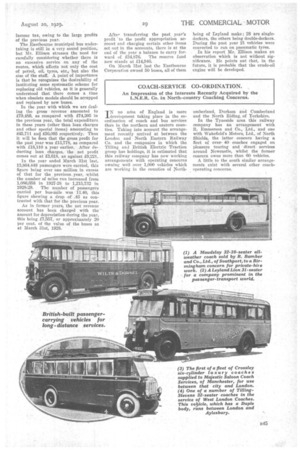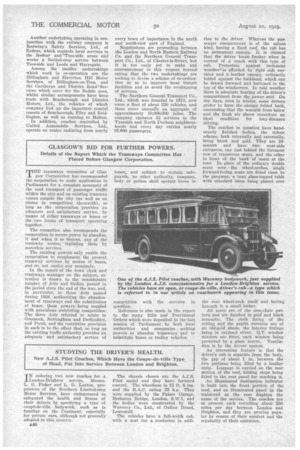COACH-SERVICE CO-ORDINATION.
Page 71

Page 72

If you've noticed an error in this article please click here to report it so we can fix it.
An Impression of the Interests Recently Acquired by the L.N.E,R. Co. in North-country Coaching Concerns.
IN no area of England is more development taking place in the coordination of coach and bus services than in the northern and eastern counties. Taking into account the arrangement recently arrived at between the London and North Eastern Railway Co. and the companies in which the Tilling and British Electric Traction group has holdings, it is estimated that this railway company has now working arrangements with operating concerns owning well over 1,000 vehicles which are working in the counties of North
umberland, Durham and Cumberland and the North Riding.. of Yorkshire.
In the Tyneside area this railway company has an arrangement with Emmerson and Co., Ltd., and one with Wakefield's Motors, Ltd., of North Shields, the• latter concern having a fleet of over40 coaches engaged on pleasure touring and direct services around Newcastle, whilst the former concern owns more than 60 vehicles.
A little to the south similar arrangements exist with several other coachoperating concerns. Another undertaking operating in conjunction with the railway company is Redwing's Safety Services, Ltd., of Redcar, which controls local services in the Redcar and "Tees-side areas and works a limited-stop service between Tees-side and Leeds and Harrogate.
Among the smaller undertakings which work in co-operation are the BiHingham and Haverton Hill Motor Services, of Billingham-on-Tees, and the Carthorpe and District Road" Services which .cater for the Bedele area, whilst similar arrangements have been made with Scarborough and District Motors, Ltd., the vehicles of which company link up the important coastal resorts of Scarborough, Piley and Bridlington, as well as running to Mallon.
In addition, coaches controlled by United , Automobile Services, Ltd., operate on routes radiating from nearly every town of importance in the north and north-east part of England.
Negotiations are proceeding between the London and North Eastern Railway Co. and the Northern General Transport Co., Ltd., of Chester-le-Street, but it is too early yet to make any announcement in this respect beyond saYing that the two undertakings are seeking to devise a scheme of co-ordinatiotf so as to improve local transit facilities and to avoid the overlapping of services.
The Northern General Transport Co., Ltd., which was founded in 1913, now owns a fleet of about 330 vehicles, and these cover annually an aggregate of approximately 10,000,000 miles. The company operates 33 services in the 'Tyneside and North Durham neighbourhoods and every day carries nearly 97,000 passengers.
tin to the driver. Whereas the passenger compartment is of the saloon kind, having a fixed roof, the, cab has no permanent canopy. It is claimed that the driver keeps fresher when in control of a coach with this type of cab. Protection against inclement weathert is afforded by rigid side curtains and a leather canopy, ordinarily folded against the bulkhead, which can be drawn forward and buttoned to the top of the windscreen. In cold weather there is adequate heating of the driver's compartment from the power unit. On dry days, even in winter, some drivers prefer to have the canopy folded back, contending that the warmth from below and the fresh air above constitute an ideal condition for Jong-distance driving.
The coaches in question have handsomely finished bodies, the colour scheme, both internally and externally, being black and gold. They are 24seaters and have two near-side entrances, one just behind the foremost row of transverse seats, and the other in front of the bank of seats at the rear. In place of the ordinary double seats over the wheel-arches, single forward-facing seats are fitted close to the gangway, a neat glass-topped table with standard lamp being placed over




















































































































